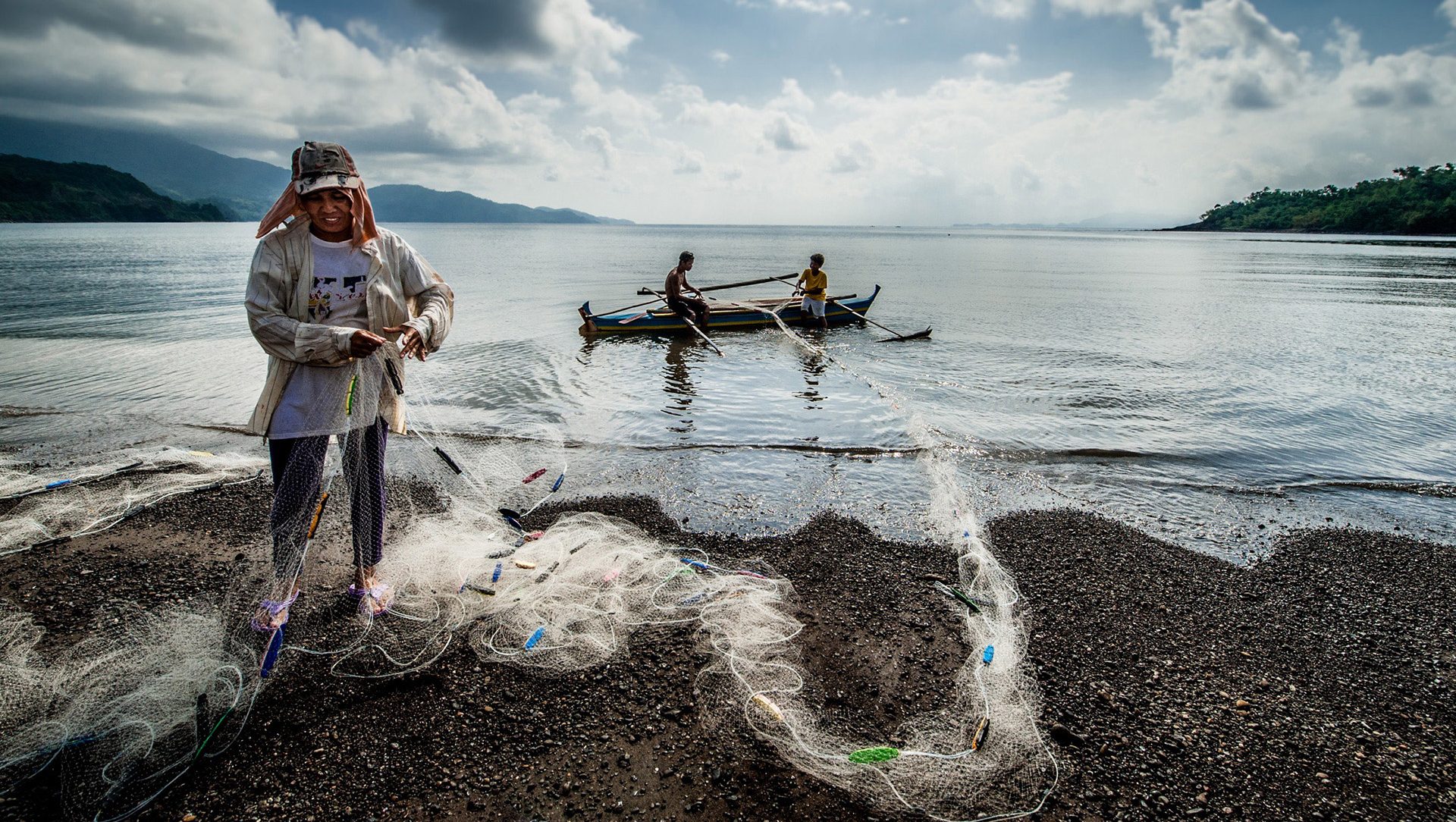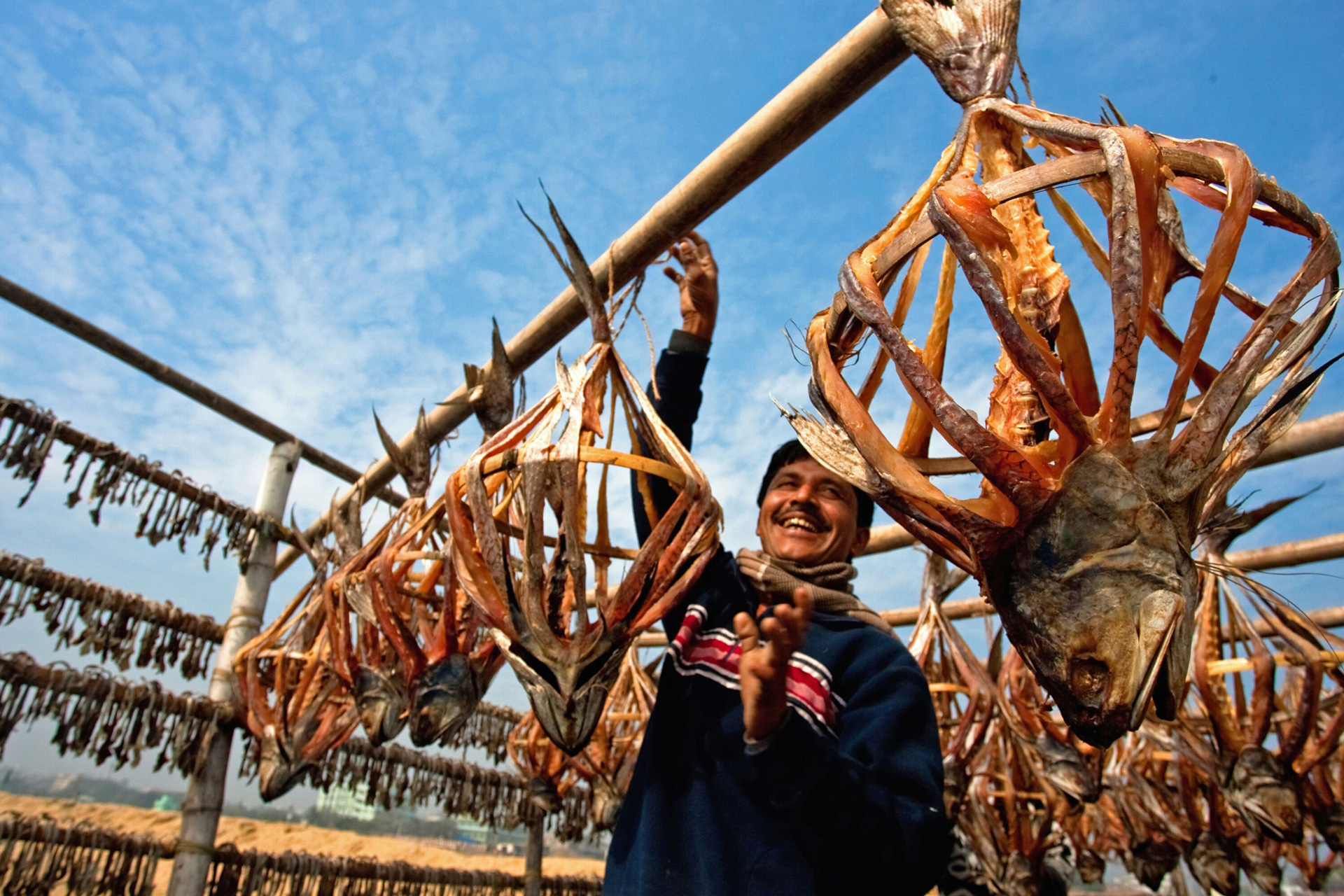| About UNCDF
UNCDF makes public and private finance work for the poor in the world’s 47 least developed countries. With its capital mandate and instruments, UNCDF offers “last mile” finance models that unlock public and private resources, especially at the domestic level, to reduce poverty and support local economic development. UNCDF’s financing models work through two channels: financial inclusion that expands the opportunities for individuals, households, and small businesses to participate in the local economy, providing them with the tools they need to climb out of poverty and manage their financial lives; and by showing how localized investments — through fiscal decentralization, innovative municipal finance, and structured project finance — can drive public and private funding that underpins local economic expansion and sustainable development. By strengthening how finance works for poor people at the household, small enterprise, and local infrastructure levels, UNCDF contributes to SDG 1 on eradicating poverty and SDG 17 on the means of implementation. By identifying those market segments where innovative financing models can have transformational impact in helping to reach the last mile and address exclusion and inequalities of access, UNCDF contributes to a number of different SDGs.
About SHIFT ASEAN and SAARC
UNCDF’s ‘Shaping Inclusive Financial Transformations’ (SHIFT) program aims to catalyze access to formal financial services to advance women’s economic empowerment and gendered financial inclusion for millions of women and small businesses in the ASEAN and SAARC markets. SHIFT leverages product and business model innovations, data analytics, technical training, and policy advocacy services at different levels to change the behavior of market players. Data and research crosscuts into all SHIFT’s activities as the shaping of inclusive financial transformations cannot be accomplished without the use of good data and research to inform and facilitate markets. SHIFT advocates evidence-based financial inclusion policies and practices that expand access and usage of financial services for women by facilitating, informing and incentivizing FSPs, regulators and governments and by stimulating collective dialogue between them.
UNCDF SHIFT programs works through four interrelated outputs: The Data and Analysis Hub produces and disseminates knowledge on supply, demand and regulation in financial markets to strengthen the evidence base and investment decisions of providers, regulators and policy makers to advance women’s financial inclusion. This is closely integrated with the Learning and Skills Development facility that capacitates technical service providers to scale viable learning and training models for financial institutions. The Policy and Advocacy component stimulates dialogue among policy makers in FSPs and governments to enable financial market policies to be more responsive to the needs of women. Finally, the Innovation Facility offers various types of incentives to FSPs to pilot new prototypes and scale viable innovative (digital) finance business models to advance access to and usage of finance for women.
About other UNCDF projects
- SHIFT ASEAN has been established in 2014 with initial funding from the Australian Government and focuses on ASEAN’s frontier economies of Cambodia, Lao PDR, Myanmar and Viet Nam (CLMV). The progamme aims to catalyze access to formal financial services to advance women’s economic empowerment and gendered financial inclusion for millions of women in the ASEAN.
- SHIFT SAARC has been established in mid-2016 with initial funding of the European Commission and Bill and Melinda Gates Foundation earmarked for Bangladesh. The programme aims for Digital Finance Services to become widely recognized by regulators and providers as enabler of financial inclusion and thereby increasing its use among the adult population from 9% to 30% by 2019.
- UNCDF Myanmar Country Program: UNCDF Myanmar hosts various programs working among other on the national financial inclusion strategy, innovative financing and digital financial services. For example the WEFIP project funded by DFID (2018-2020) on women’s empowerment aims to reach 200,000 women and girl beneficiaries of which the majority are women and girls from conflict-affected and/or post-conflicts areas of the country. At supply side for financial service providers the project promote gender-sensitive financial products and services and supporting non-financial services; and at demand side it aims to enhance women and girls’ financial capabilities, voice and demand for finance. Finally, at policy level it supports with gendered financial inclusion analytics and policy making.
- UNCDF’s CleanStart catalyzes digital energy finance (through Pay-Go energy systems) as a promising solution to reduce energy poverty. Active in Asia and Africa, the programme currently reaches over 221.000 people.
- About Digital@UNCDF UNCDF is the overarching programme under the Financial Inclusion Practice Area focusing on Digital Financial Services and how they can improve financial inclusion for sustainable development for vulnerable groups.
This solicitation is for a Framework agreement, also known in UNCDF as the Long-Term Agreement (LTA) for one year and renewable up to a maximum of one (1) year based on satisfactory performance of an individual consultant. An “LTA” refers to a mutual agreement whereby the Consultant(s) will provide services as required, over a specific period. It specifies the unit price (daily rate) allowing for an LTA to be used when the Consultant’s services are needed.
Where a request for services arises, UNCDF can engage the individual(s) holding an LTA through a “call-off” of the LTA. Every call-off shall have specific tasks, scope of services and outputs to be delivered within a specific period of time. For this particular work, the call-off shall be formalized through the issuance of a Purchase Order, attaching thereto the TOR, and any other document relevant to the call-off. Financial commitments will only be established each time a Purchase Order for the specific services/TOR for Individual Contractor is issued.
The LTA shall have a cumulative ceiling amount that may accrue to the individual contractor during the life of the LTA, but said amount shall remain as an upper limit, and must not and cannot be interpreted nor understood as neither a financial commitment nor guarantee of business volume. It is important to note that, under an LTA, UNCDF does not guarantee that any specific quantity of services shall be made during the term of this agreement. The LTA does not form a financial obligation nor commitment from UNCDF at the time the LTA contract is signed |
| Objectives of the Assignment
UNCDF Asia Regional and Myanmar Country office are looking to enter into a Framework Agreement, also known as Long-Term Agreement (LTA), with up to three (3) Big Data Analytics Consultant(s) who will be primarily responsible for producing, curating and communicating data and information on supply, demand and regulation in financial markets to strengthen the evidence-base and investment decisions of providers, regulators, and policy makers. S/he will report directly to the Data Management Specialist (Analytics & Research) based in the UNCDF Regional Asia office in Bangkok.
The Big Data Analytics Consultant(s) will support a variety of action research and analysis activities for the Data hub in Bangkok, and working primarily under the SHIFT ASEAN, SHIFT SAARC programmes, UNCDF Myanmar, CleanStart and UNCDF’s digital strategy. The Big Data Analytics Consultant(s) will analyze, curate and communicate data and information on supply, demand, policy and innovation case studies with focus on Asian countries including Myanmar, Cambodia, Laos PDR, Viet Nam, Malaysia, China and more regional based studies. S/he will keep data outputs simple, digestible and with focus on the usage of data to improve financial inclusion policy and product development.
The Big Data Analytics Consultant(s) will work primarily under the UNCDF Regional Data and Analysis Hub that aims to strengthen the availability and use of supply side (e.g. Big Data and transaction records) and demand side (national financial inclusion survey) analytics by conducting regional and sector research on specific themes such as financial inclusion for women, youth, MSMEs, migration and remittances, and energy finance to help drive financial inclusion policy and practice. The Hub generates substantial market intelligence, through demand side data (1), by assessing large demand side national survey datasets (e.g. FinScope, Findex, Intermedia, Enterprise Development Survey, GEM); on the supply side (2), through supply side data, by analyzing Big data including anonymized customer and transaction records (loans, savings, payments) for financial service providers and (3) on the innovation and policy environment by systematic qualitative assessment of digital finance innovation and policy case studies.
The Big Data Analytics Consultant(s) will also support the delivery of training and capacity building activities related to data, research and M&E as well as provide support with the analysis, synthesis and communication of data and research on supply, demand and regulation- sides to strengthen the evidence-based investment decisions of financial service providers, regulators, and policy makers.
Specific areas of work include:
- Theme 1: Conduct deep-dive thematic research on demand and supply side data on financial inclusion and specific SDGs (20%)
- Theme 2: Support in data curation and analytics and experimenting with new data techniques (20%)
- Theme 3: Conduct trainings and technical support to Financial Service Providers and Energy Service Providers in product development and data analytics and usage (20%)
- Theme 4: Conduct trainings and technical support to Regulators (e.g. Central Banks) in financial inclusion strategy monitoring and policy making. (20%)
- Theme 5: Knowledge Management and Learning (20%)
Scope of Work
Theme 1: Conduct deep-dive thematic research on digital financial inclusion and economies with specific reference to gender, youth, migrant and remittances, MSMEs, energy finance or agriculture using demand side and supply side data.
- Analyze, consolidate and communicate data and insights on financial market supply and demand with focus on sex, youth, and other demographic and geographic disaggregated data analytics.
- Conduct demand side analytics on financial access and national surveys such as Findex, Finscope, National Household Surveys, Global Entrepreneurship Monitoring, Enterprise Development Surveys- to support the development of (sex-disaggregated) national financial inclusion strategies, market scoping and product development.
- Conduct supply side analysis using anonymized customer and transaction level data of (digital) financial service providers to track financial service usage and impacts by conducting sex- youth and other demographic disaggregated data analysis;
Theme 2: Support in data curation and analytics and experimenting with new data techniques.
- Maintain and update the national survey datasets such as Findex, FinScope and Intermedia, enterprise development, power, financial diaries and other demand side datasets.
- Support in Data curation, maintain, acquire and mine datasets of financial service providers;
- Support the development of financial inclusion and SDG-related interactive dashboards.
- Conduct systematic qualitative case study analyses documenting the progress of digital finance and Fintech innovations through qualitative databases, if requested.
- Coordinate and conduct innovative ways of doing product and policy assessment through lean data and Big data assessment to measure financial inclusion impacts on SDGs such as poverty, empowerment, women’s empowerment, energy access etc.
Theme 3: Conduct trainings and technical support to Financial Service Providers and Energy Service Providers in product development and data analytics and usage. To track customer journeys over time and improve human centric design through data.
- Conduct Big data training, mine regulatory monitoring and financial inclusion datasets. The training week includes also possible visits for collaboration with other partners, including conducting dissemination workshop, partner-visits for resource mobilisation and pipeline development and/or mission debriefing to the Bangkok regional office and Produce PowerPoint report.
- Offer Technical support in human-centric product design to FSPs with regard to data treatment and usage and product development.
- Support and coordinate innovative lean data surveys for SDG impact measurement and monitoring.
Theme 4: Conduct trainings and technical support to Regulators (e.g. Central Banks) in financial inclusion strategy monitoring and policy making.
- Conduct trainings with regulators on the use of data for the national financial inclusion strategy and financial inclusion policy design and monitoring and evaluation.
- Offer technical support to regulators on implementation of financial inclusion strategy monitoring and evaluation and develop data action and monitoring plans.
Theme 5: Knowledge Management and Learning:
- Support in content development for knowledge products including working papers, dashboard, blogs, website materials, presentations etc. Review and edit, working papers, research and communications materials;
- Support in the development of training modules for the data hub facility. The Hub aims to capacitate regulators and financial service providers in their data analysis and human centric product and policy design.
- Identify areas where data-collaboratives can enhance (digital) financial inclusion, both within the UN system as well with our external private sector partners. If needed, engage with University and other research institutions to establish partnerships and promote UNCDF’s work.
- Use insights to support overall program development and inform the UNCDF digital strategy.
Final Products
The consultant(s) will deliver the following final products:
Output 1:
- Conducted Thematic Deep Dive research on for example (digital) financial inclusion and gender equality, youth empowerment, clean energy, agricultural development, migration and development.
- Produced content for financial inclusion focus notes, presentations, blogs, infographics, policy notes.
- (Co-)authored working papers and focus notes with particular reference to (digital) financial inclusion and sustainable development goals related topics such as inclusive economic growth and decent work, youth empowerment, gender equality, MSME development, green energy, agricultural development, migration and development, education and health.
Output 2:
- Curated, mined and analyzed supply side and demand side data so it is easily accessible and generates insights for UNCDF team and programs.
- Produced Synthesis report on digital finance and FinTech innovations case studies.
- Produced Interactive Dashboards accessible for programs (in Tableau or PowerBI)
- Designed Surveys for SDG monitoring through lean data (mobile phone surveys) on for example poverty, women economic empowerment, inclusive growth and enterprise growth.
Output 3:
- Offered trainings on product development and data analysis and usage to staff and management of financial service providers and energy service suppliers.
- Offered Technical support in human-centric product design to FSPs with regard to data treatment and usage and product development.
Output 4:
- Offered trainings and technical support on financial inclusion policy and data analysis and usage to staff and management of regulators (e.g. Central Banks).
- Supported development of monitoring and evaluation indicators for national financial inclusion strategies.
Output 5:
- Submitted research content for presentations, data dashboards, maps, blogs, data for info-graphics.
- Disseminated outcomes and knowledge at forums, webinars, and workshops.
- Identified potential data collaboratives and generated insights to support programme direction.
UNCDF reserves the rights to assign the TOR deliverables and to distribute the assignment to at least three consultants, as UNCDF may deem appropriate to their qualifications. The three consultants will be part of a broader data analytic team and will have somewhat similar activities as outlined in more detailed in the scope of work table below. A Standard Operating Procedures (SOP) on how each of the consultants will be called and for what type of work shall be developed for this purpose. The SOP shall take into consideration the following :
- One consultant who can support Asia on (digital) finance for women’s and youth economic empowerment and/or entrepreneurship. One focus country here is Myanmar, where at least 50% of the consultant’s activities will take place to support Myanmar financial service providers and regulators.
- One consultant who can support analytical work on digital finance for remittances, migration and development in Asia. Around 50% of the consultant’s activity will be working with Asian remittance service providers and regulators.
- One consultant with focus on Africa who can support analytical work on digital energy finance as well as remittances, migration and development (French speaking).
All three consultants are required to speak English, at least one consultant would need to speak French.
Beyond common data analytic activities, within the team UNCDF is looking for consultants who may address specific themes. For this purpose, applicants are encouraged to highlight their specific expertise that corresponds to the thematic fields below:
- (Digital) Financial inclusion and Women’s and Youth economic empowerment
- (Digital) Financial inclusion and MSME growth
- (Digital) Financial inclusion and decent work and inclusive economic growth
- Digital energy finance
- Digital finance for agricultural development
- International Remittances and Migration and Development
|
Education
- Masters or PhD in Development Studies, Economics, Econometrics, Data Science, Business Administration, or similar studies;
Experience
- Minimum of one (1) year of relevant professional experience with expertise in (digital) financial inclusion, banking and investment or development finance;
- Proven experience of a minimum of 2 years in undertaking Big data analytics, statistical and/or other quantitative research.
- Exceptional quantitative and qualitative research and analysis skills;
- Proven experience of being able to curate and mine large and diverse datasets with over 1000 indicators and/or over one million records, while keeping data outputs simple and digestible.
- Ability to communicate complex ideas effectively both verbally and in writing -in English.
- Advanced knowledge and experience of statistical and quantitative data analytic software such as R-studio/ STATA/ Tableau. Power-BI/ Nvivo/ Phyton, ability to handle large datasets.
- Hands on experience with qualitative analysis software (e.g. NVIVO) is considered advantageous.
- Analytical skills: ability to think strategically and rapidly analyze, interpret and integrate data information from various data sets into clear conclusions and recommendations.
- Strong presentation and training skills.
- Ability to balance multiple research projects with mixed short and long-term deadlines.
Language
- Fluency in English (written and oral).
Desired Attributes
- Strong interest in and affiliation with data analysis and usage, Big Data, capacity building, innovation, (organizational) learning and change management.
- Innovative mindset, capacity to learn and explore new research and knowledge dissemination methods.
- Applicants are encouraged to highlight thematic expertise in data analytics with regard to financial inclusion and women’s and youth economic empowerment and/or entrepreneurship, remittance and migration and development, digital energy finance.
- Applicants are encouraged to highlight any specific in-country experience including West Africa, South and South East Asia and specifically in Myanmar.
Monitoring and Progress Control
The consultant(s) will work under the direct supervision of the Senior Regional Technical Advisor (SRTA) based in Bangkok and in close collaboration with other relevant colleagues, experts and/or institutions designated by the SRTA.
The consultant(s) will have weekly communication with the Regional Office in Bangkok via email and skype, for coordination and guidance purposes, ensuring consultants’ output quality and targets.
The Consultant(s) is responsible for providing his/her own laptop during the course of his/her engagement with UNCDF.
This contract is under a framework agreement that will work on a call-off mechanism. The consultant will be ‘called’ upon to deliver a specific set of deliverables under a TOR and a purchasing order, indicating the total number of days required to complete the services. The contractor shall submit the invoices specifying the outputs delivered and the Certificate of Payment form for the approval of UNCDF.
The following supporting documents will serve as conditions for payments to an Individual Contractor(s): (i) submission of an invoice and Certificate of Payment (COP); (ii) review, approval and written acceptance of each deliverable by the Senior Regional Technical Advisor (SRTA) and any other Project/Programme Manager designated by SRTA; (iii) submission of a time-sheet and expenses with relevant supporting documentation; and (iv) an authorization of payment disbursement from a direct supervisor.
Where payment is based on days worked and not on milestone outputs, the submission of time sheet and expenses with relevant documentation may be required by UNCDF.
UNCDF shall closely monitor the performance of the Individual Contractors, and such monitoring shall include the detailed tracking of cumulative payments ensuring that they do not exceed the approved limit of the LTA.
If the consultants fail to meet performance requirements detailed above, s/he will receive in first instance, a communication requesting an improvement in performance. Continued failure to meet performance requirements may result in termination of the call-off PO, the non-utilization of the LTA, until its expiration, and eventually non-extension of the LTA.
Application Process
Interested individual consultants must submit the following documents/information to demonstrate their qualifications. Proposers who shall not submit below mentioned documents will not be considered for further evaluation. (NOTE: THE SYSTEM DOES NOT ALLOW MULTIPLE UPLOADS OF DOCUMENTS THEREFORE APPLICANTS MUST MAKE SURE TO UPLOAD ALL REQUIRED DOCUMENTS IN ONE FILE). Failure to submit all the below mentioned documents may result in rejection of the application.
- A one-page cover letter responding to the competency criteria, indicating why the candidate considers himself/herself suitable for the required consultancy as well as stating the earliest availability.
- Detailed updated CV or P11, with at least two (2) signed professional references or three references’ contact details; Link to P11: http://sas.undp.org/documents/P11_Personal_history_form.doc
- Filled in and duly signed Letter of Intent including a financial proposal which can be downloaded from :
https://popp.undp.org/_layouts/15/WopiFrame.aspx?sourcedoc=/UNDP_POPP_DOCUMENT_LIBRARY/Public/PSU_%20Individual%20Contract_Offerors%20Letter%20to%20UNDP%20Confirming%20Interest%20and%20Availability.docx&action=default
- At least one (1) sample or detailed summary of works with relevant links – that you consider to be the best and most relevant example to this ToR.
Evaluation Criteria
Applications will be rated on both technical and financial submissions. The following selection method will be used: Highest rated proposal using the combined scoring method, which assigns the weight distribution between the technical and financial proposals. The overall combined score will be 100 points, where weight distribution shall be 70% technical (30% desk review + 40% interview) and 30% financial.
Step I: Screening
Applications will be screened and only applicants meeting the following minimum criteria will progress to the pool for shortlisting:
Education:
- Masters or PhD in Development, Economics, Econometrics, Data Science, Business Administration, or similar studies;
Experience
- Minimum of one (1) year of relevant professional experience with (digital) financial inclusion, banking and investment or development finance;
- Proven experience of a minimum of 2 years in undertaking Big Data Analytics, or statistical and other quantitative research.
Step II: Shortlisting by Desk Review: (100 Points)
UNCDF will conduct a desk review to produce a shortlist of candidates and technically evaluate candidates as follows:
- Level of relevancy of working experience in (digital) financial inclusion, banking and investment or development finance – 30 points
- Functional competencies for assignment (big data analytics and research and software skills) – 50 points
- Advanced knowledge and experience of statistical and quantitative data analytic software such as R-studio/ STATA/ Tableau / Power-BI / Nvivo / Phyton, ability to handle large datasets – 10 points
- Exceptional quantitative and qualitative research and analysis skills – 10 points
As applicable, up to 9 applicants scoring the highest in the desk review and achieving minimum 70 points shall be invited for an interview.
Step III. Interview:
A competency-based Interview shall be conducted with the top 8 shortlisted candidates who will be asked on the following:
- Relevant experience
- Sector Knowledge
- Communication Skills
- Demonstrated ability to use data to drive financial inclusion practice and policies
Step IV: Financial Evaluation:
The shortlisted candidates will be rated on both technical and financial submissions, providing a weight of 70% to the Technical offer (Desk Review (30%) + Interview (40%)) and 30% to the Financial offer.
The following formula will be used to evaluate financial proposal:
Lowest priced proposal/price of the proposal being evaluated x 30%.
AWARD OF LONG-TERM AGREEMENT (LTA)
The award of the LTA will be made to up to 3 individual consultants whose offers have been evaluated and determined (i) Responsive/compliant/acceptable; and (ii) Having received the highest score out of a pre-determined set of weighted technical and financial criteria specific to the solicitation.
Individual Consultants are responsible for ensuring they have vaccinations/inoculations when traveling to certain countries, as designated by the UN Medical Director. Consultants are also required to comply with the UN security directives set forth under dss.un.org. If the consultant is over 65 years old, UNCDF reserves the right to require full medical certification and clearance from the consultant’s physician prior to commencing the travel.
Please include all documents into one file while submitting your application.
Referenfces
UNDP’s Individual Consultant’s General Terms and Conditions are provided here:
http://www.undp.org/content/dam/undp/documents/procurement/documents/IC%20-%20General%20Conditions.pdf
Click here to view vacancy |






